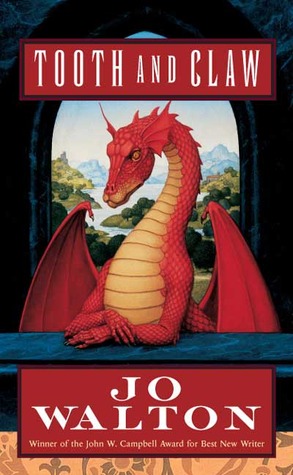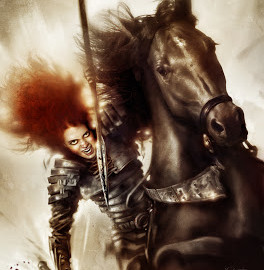I’m a woman. Furthermore, I’m about as heterosexual as people get, and I’m a mother. Also, I have long hair, like cooking, I’m married and I don’t earn as much as my husband. I sometimes wear jewelry and I like how I look. I think that’s absolutely it for standard female-identified stuff. All the rest of it I hate — sewing, clothes, make-up, messing with hair, flirting, shoes, being protected, being the angel in the house, skirts, being maternal, ick ick ick.
I hate definitions that try to prescribe, that say that as a woman I must be X. But I also hate ones that prescribe the opposite way, that say that all of X is boring and not worth consideration. If you say I need to know seventy-six shades of lipstick or be an ersatz man, I twitch, if you say living in any way other than as bears with furniture is a waste of time, I twitch again. I don’t care which parts of me you are trying to chop off to make the shoe fit, whether it’s the heel or the toe that’s still a sharp knife and bits of my body.
I once got accused of not being a real woman because I believe in following the laws of logic in debate. It took me about a year to think of the correct response to that, which would have been to burst into tears, because anything I said would lose me points, anything at all.
The thing about growing up female is it comes with a pile of baggage — women have been regarded as nurturing and gentle for a long time, and also as inferior, unimportant, differently important, all that sort of thing. I’ve had to do a lot of flat out fighting to be acknowledged as a human being with a valid point of view worth listening to, and it gets very wearying, and when you win — I win — what you have won is not an acknowledgement that women are people but that you personally are an exception, not really one of them.
It gets tiring and it gets boring and it leads into bad patterns of its own. And you have to fight it from both sides, from women who want you to fit in as well as men pushing you back into that box. But all the same, it’s easy (ha!) to get marked that exception. There’s a striking example of it in the film L’Auberge Espagnol where the guys are sitting on the sofa drinking beer while one girl cleans the kitchen and one of the other girls comes in, takes a beer and sits on the sofa arm. That sofa arm is available, it’s easy, and it’s a role called exception. I call it Mary, so much more fun that Martha. After all, you don’t want to be with her pushed back in that kitchen and unable to get out and talk.
In fiction, all too many of the strong women we see are Marys, and all too many of the Marthas are invisible. There are a lot more Marys than there were thirty years ago. It used to annoy the hell out of me that there were so few good girls parts. Now there are way more, but they are pretty much all Mary, Exception, they let Martha get on with cleaning that kitchen while they sit down with the guys and the beer.
It’s not the only choice. All of us could get up and clean the kitchen. Martha might have something interesting to say…
The place I started with making the world for the Sulien books was with the poem Thirty Sword, which is http://www.bluejo.demon.co.uk/sulien/sw
Well, in writing three books, or two volumes, or a 300 kword novel, however you want to look at it, to explicate the background to the poem, I did get across someone realizing what duty was, and what peace was, but I also failed with a lot of things. One of the reasons for this was because of Sulien’s POV — she’s emotionally dense, she’s oblivious to whole swathes of human experience, and I got some things in around that, but not enough. The choices I made about making her like that weren’t actually conscious, and worked out pretty well for me in some ways.
I did try to show other female choices, but it didn’t work that well. The other women in the alae had sex lives, Marchel, Alswith, Enid. Garah served as an example of a lot of things — class mobility, and the kind of options open to women outside the alae. Aurien was another kind of example. So was Veniva. So was Elenn, and that’s where I failed worst, which is why I wrote Prize, and if I failed with Elenn in Prize too, at least I failed in a different way. At the end of Prize you ought to know why Elenn didn’t come out of Caer Tanaga with Garah.
What I’m trying to do at the moment is tell a very simple story in a very complicated world, and one of the things I want is a Martha character with something to say, and for the story not to undercut that.
And what I’d like in real life is not to be an exception, to stop needing to fight that battle on either side. I’d like Zorinth not to be embarrassed about admitting to his friends that he made the cake. I’d like him to be proud of it, as if he were a girl.
We muddle along and do the best we can.



